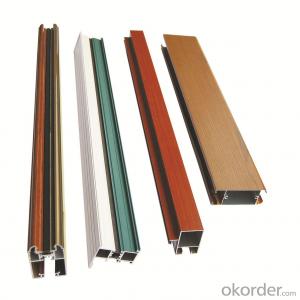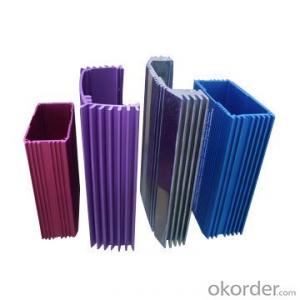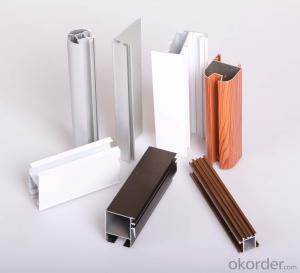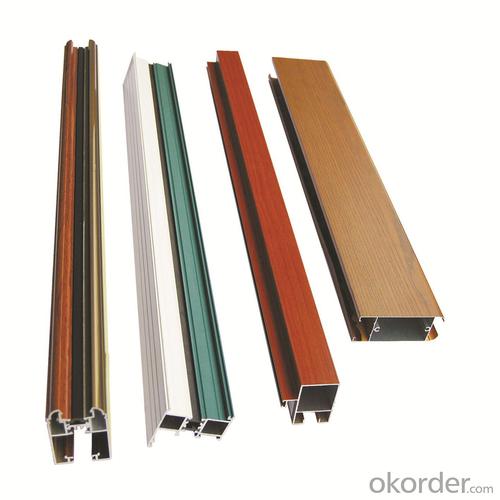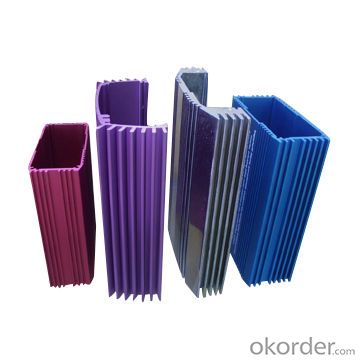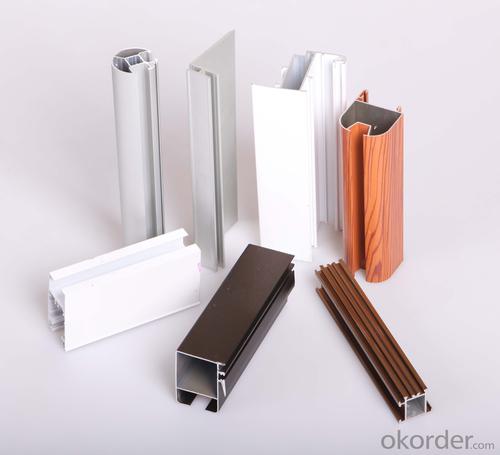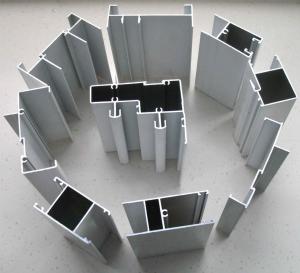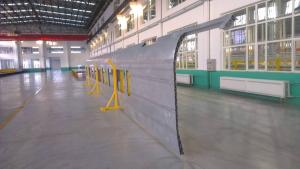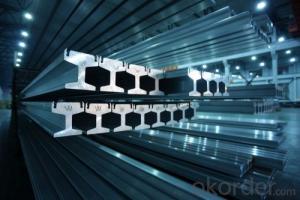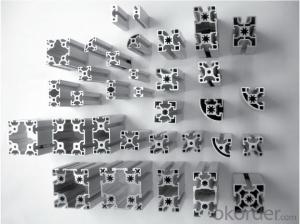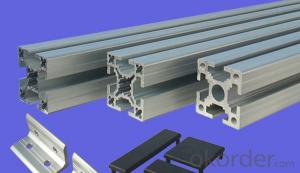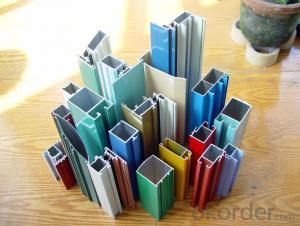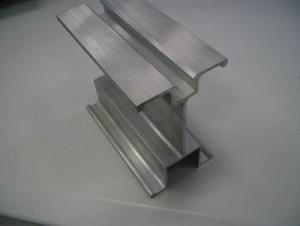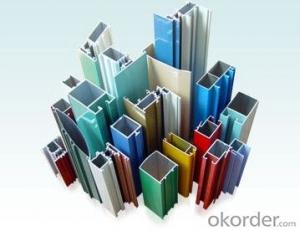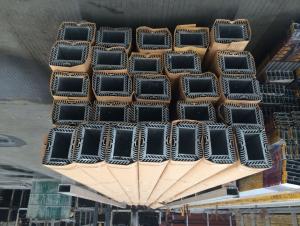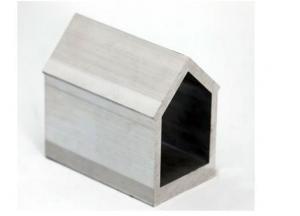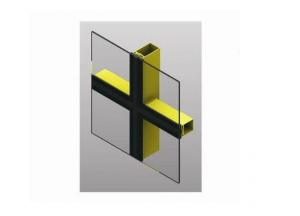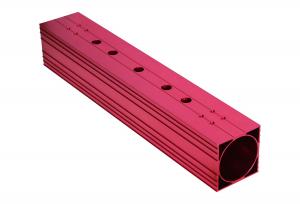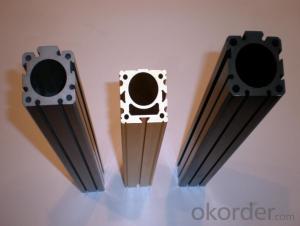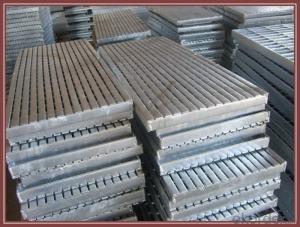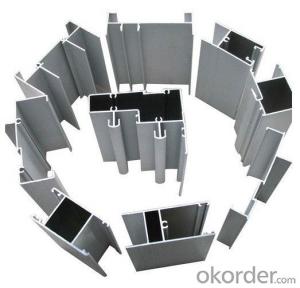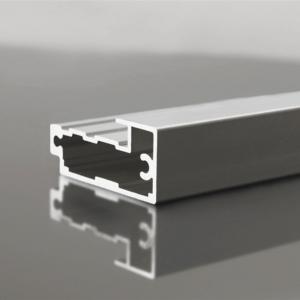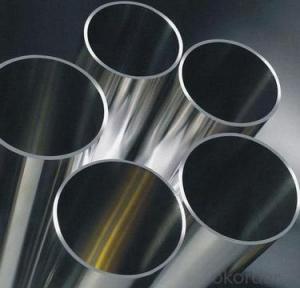Aluminum Extrusion Standard Profiles of Good Surface
- Loading Port:
- China Main Port
- Payment Terms:
- TT OR LC
- Min Order Qty:
- -
- Supply Capability:
- -
OKorder Service Pledge
OKorder Financial Service
You Might Also Like
Aluminium is a relatively soft, durable, lightweight, ductileand malleablemetalwith appearance ranging from silvery to dull gray, depending on the surfaceroughness. It is nonmagnetic and does not easily ignite. A fresh film ofaluminium serves as a good reflector (approximately 92%) of visible lightand an excellent reflector (as much as 98%) of medium and far infraredradiation. The yield strength of pure aluminium is 7–11 MPa,while aluminium alloys have yield strengths ranging from200 MPa to 600 MPa. Aluminium has about one-third the densityand stiffness of steel. It is easily machined,cast, drawn and extruded.
Features:
Material | Alloy 6063,6061,6005or according to customer’s choice |
Temper | T3, T4, T5, T6 |
Surface | Anodize, electrophoresis, powder coating, PVDF coating, wood grain painting, matted, etc. |
Length | Coating 6.5 meters, Anodizing 6.5 meters, Mill finish 5 meters |
Application | Industrial, electrical equipment(TV set, air conditioner, refrigerator, computer), decoration,construction, transportation |
Custom Made | We can package following with customer's request. |
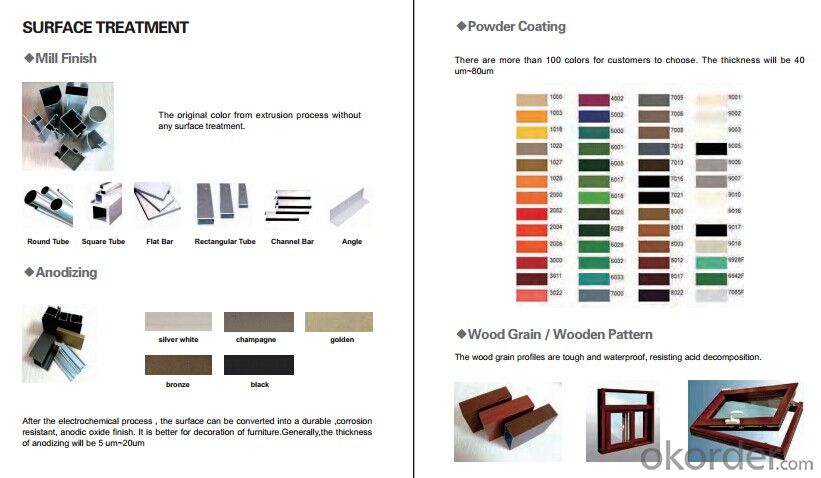
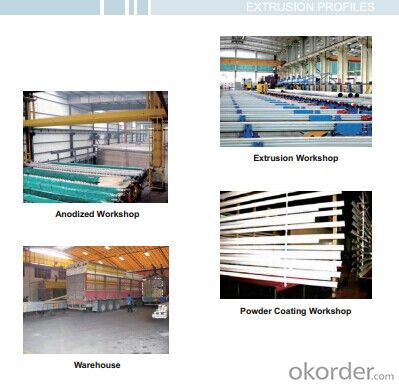
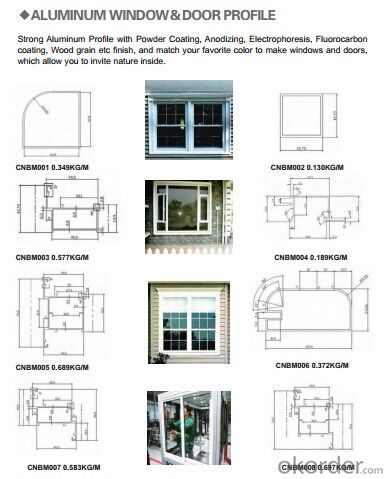
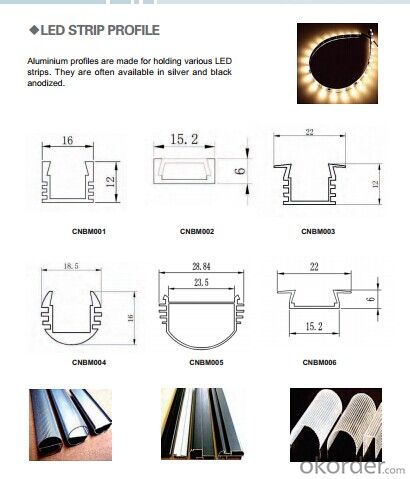
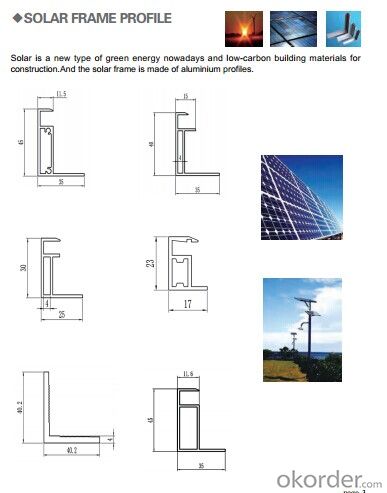
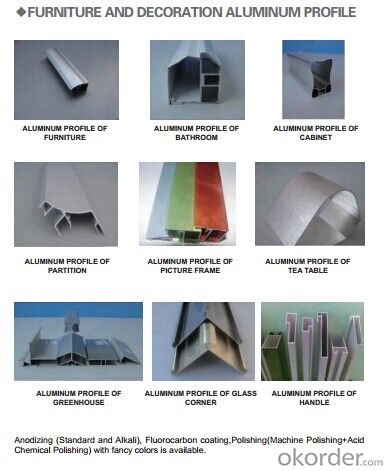
- Q: This question asks for the various types of aluminum profiles that are utilized in roofing systems.
- <p>Aluminum profiles for roofing systems come in various types, each serving specific purposes. Common types include: 1. <strong>Gutter Profiles</strong>: Used for collecting and directing rainwater from the roof. 2. <strong>Fascia Profiles</strong>: Cover the ends of rafters and provide a finished edge to the roof. 3. <strong>Soffit Profiles</strong>: Installed under the eaves to allow ventilation and conceal the underside of the roof. 4. <strong>Purlin Profiles</strong>: Support the roof sheeting and are placed perpendicular to the rafters. 5. <strong>Rafter Profiles</strong>: Mimic traditional wooden rafters and provide structural support. 6. <strong>Roof Ridge Profiles</strong>: Cap the ridge of the roof, where two slopes meet. 7. <strong>Hip and Valley Profiles</strong>: Used at the intersection of two sloping roof surfaces. Each profile is designed to withstand weather conditions and provide durability, with specific dimensions and shapes tailored to the roofing system's requirements.</p>
- Q: Can aluminum profiles be used for lighting fixtures or systems?
- Yes, aluminum profiles can be used for lighting fixtures or systems. Aluminum is a lightweight and versatile material that is commonly used in the construction of lighting fixtures due to its durability, corrosion resistance, and heat dissipation properties. Aluminum profiles can be easily fabricated into various shapes and sizes, making them suitable for different lighting applications such as recessed lighting, track lighting, pendant lighting, and more. Additionally, aluminum profiles can be anodized or coated with different finishes to enhance their aesthetic appeal and protect them from environmental elements. Overall, the use of aluminum profiles in lighting fixtures or systems allows for efficient and effective lighting solutions while maintaining a sleek and modern design.
- Q: Can aluminum profiles be used for creating protective enclosures?
- Indeed, protective enclosures can be fashioned using aluminum profiles. Aluminum, being a lightweight, long-lasting, and corrosion-resistant substance, proves itself fitting for a plethora of purposes, including protective enclosures. By effortlessly fabricating and assembling aluminum profiles, one can generate tailored enclosures of diverse dimensions and forms. They grant exceptional structural integrity and endure even the harshest environmental circumstances. Furthermore, in the event that efficient heat dispersal is necessary, aluminum profiles present commendable thermal conductivity. All in all, the versatility, strength, and durability of aluminum profiles render them a favored choice for the creation of protective enclosures.
- Q: How much is aluminum freight per kilometer per ton?
- China Logistics Network: batch transportation more than 30 tons, 40 yuan per ton per ton
- Q: Can aluminum profiles be used in lighting fixture manufacturing?
- Yes, aluminum profiles can be used in lighting fixture manufacturing. Aluminum is a lightweight and durable material that is often preferred for its ability to dissipate heat, making it ideal for use in lighting fixtures. Additionally, aluminum profiles can be easily customized and shaped to fit various design requirements, making them a popular choice in the lighting industry.
- Q: What are the different sealing options for aluminum profiles?
- There are several sealing options available for aluminum profiles, including anodizing, powder coating, liquid paint coating, and mechanical sealing. Anodizing is a popular choice, providing a durable and corrosion-resistant finish by creating a protective oxide layer on the surface of the aluminum. Powder coating involves applying a dry powder to the profile, which is then cured under heat to form a hard, smooth coating. Liquid paint coating can also be used, offering various colors and finishes, but may require more maintenance. Mechanical sealing involves using gaskets, tapes, or other sealing materials to create a tight seal between aluminum profiles. The choice of sealing option depends on the specific requirements of the application, such as desired aesthetics, durability, and environmental factors.
- Q: How do aluminum profiles contribute to sustainable packaging solutions?
- The eco-friendly properties of aluminum profiles are crucial in promoting sustainable packaging solutions. Firstly, aluminum is highly recyclable, and its profiles can be easily recycled without losing their inherent qualities. This enables a closed-loop recycling system, reducing the need for new raw materials and minimizing waste. In addition, aluminum profiles offer exceptional strength and durability, ensuring that packaging made from them can withstand rigorous handling and transportation. This durability reduces the likelihood of damage or breakage, resulting in less product waste and minimizing the need for additional packaging materials. Furthermore, aluminum profiles provide excellent barrier properties, protecting the contents of the packaging from external factors like moisture, oxygen, light, and temperature variations. This helps extend the shelf life of products, reducing food waste and ensuring that goods remain fresh and safe for consumption. Moreover, aluminum profiles are lightweight, contributing to energy savings during transportation. The lightweight nature of aluminum packaging allows for reduced fuel consumption and lower carbon emissions, making it an environmentally friendly choice. Lastly, aluminum profiles are resistant to corrosion, ensuring that the packaging remains intact and functional for an extended period. This longevity reduces the need for frequent replacement, saving resources and minimizing the overall environmental impact. In conclusion, aluminum profiles promote sustainable packaging solutions by being recyclable, durable, providing excellent barrier properties, lightweight, and corrosion-resistant. These properties help minimize waste, reduce energy consumption, extend product shelf life, and lower carbon emissions, making aluminum profiles an ideal choice for eco-conscious packaging solutions.
- Q: Can aluminum profiles be used for modular systems or frameworks?
- Yes, aluminum profiles can be used for modular systems or frameworks. Aluminum profiles are lightweight, strong, and have excellent structural integrity, making them an ideal choice for constructing modular systems or frameworks. These profiles can be easily assembled and disassembled, allowing for flexibility and adaptability in designing various structures. Additionally, aluminum profiles offer good corrosion resistance, making them suitable for both indoor and outdoor applications. They also provide a sleek and modern aesthetic appeal, making them popular in architectural and industrial design. Overall, aluminum profiles are a versatile and reliable option for creating modular systems or frameworks.
- Q: What are the different bending machines or tools used for aluminum profiles?
- There are several bending machines and tools that are commonly used for aluminum profiles. These tools are designed to manipulate aluminum profiles into various shapes and angles to meet specific project requirements. 1. Manual Tube Bender: This is a hand-operated bending tool that is commonly used for smaller aluminum profiles. It consists of a lever and a bending shoe that is used to bend the profile manually. 2. Hydraulic Tube Bender: This machine is equipped with hydraulic power to bend larger and thicker aluminum profiles. It offers more precision and control compared to manual benders, making it suitable for industrial applications. 3. CNC Tube Bending Machine: This is a computer-controlled machine that uses a combination of hydraulic power and computer programming to accurately bend aluminum profiles. It can produce complex and precise bends, making it ideal for high-volume production and intricate designs. 4. Roll Bending Machine: This machine is specifically designed for bending aluminum profiles into curved shapes. It consists of three rolls, with the profile passing through the middle roll while the other two rolls apply pressure to bend it into the desired curve. 5. Mandrel Bender: This tool is used for bending aluminum profiles without deforming or collapsing the inner diameter. It uses a mandrel (a rod inserted into the profile) to support the inner wall during the bending process, ensuring a smooth and consistent bend. 6. Rotary Draw Bender: This machine uses a combination of bending dies and a rotating arm to produce accurate and repeatable bends in aluminum profiles. It is commonly used for bending tubes and pipes, but can also be adapted for aluminum profiles. These bending machines and tools offer different levels of precision, control, and production capacity, allowing manufacturers and fabricators to choose the most suitable option based on their specific needs and requirements.
- Q: Are aluminum profiles suitable for food processing or storage facilities?
- Yes, aluminum profiles are suitable for food processing or storage facilities. Aluminum is a highly versatile material that offers several advantages in these environments. Firstly, aluminum is corrosion-resistant, ensuring that it remains unaffected by moisture, food acids, or cleaning agents commonly used in food facilities. This makes it ideal for use in areas where hygiene and cleanliness are crucial. Secondly, aluminum profiles are lightweight yet sturdy, making them easy to handle and install. This is especially beneficial in food processing facilities where regular equipment maintenance and reconfigurations are required. Additionally, aluminum is a non-toxic material, ensuring that it does not contaminate food products during processing or storage. It is also an excellent conductor of heat, allowing for efficient temperature control in processing facilities. Furthermore, aluminum profiles can be easily cleaned and sanitized, reducing the risk of bacterial growth and ensuring compliance with food safety regulations. Overall, the durability, corrosion resistance, lightweight nature, non-toxicity, and ease of maintenance make aluminum profiles an excellent choice for food processing or storage facilities.
Send your message to us
Aluminum Extrusion Standard Profiles of Good Surface
- Loading Port:
- China Main Port
- Payment Terms:
- TT OR LC
- Min Order Qty:
- -
- Supply Capability:
- -
OKorder Service Pledge
OKorder Financial Service
Similar products
Hot products
Hot Searches
Related keywords
